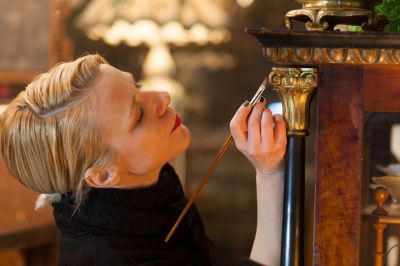Top-Rated Products For Enhancing Wood Furniture Looks
Browse essential restoration tools and products that transform old or damaged wood furniture into stunning pieces.
 Restoring wood furniture can breathe new life into cherished pieces and enhance their appearance and durability. The process often involves multiple steps, including cleaning, repairing, sanding, and finishing. Selecting the right products for each stage is essential to achieve professional-looking results and to ensure the longevity of the furniture. Whether dealing with minor scratches or extensive damage, the appropriate restoration products can make a significant difference.
Restoring wood furniture can breathe new life into cherished pieces and enhance their appearance and durability. The process often involves multiple steps, including cleaning, repairing, sanding, and finishing. Selecting the right products for each stage is essential to achieve professional-looking results and to ensure the longevity of the furniture. Whether dealing with minor scratches or extensive damage, the appropriate restoration products can make a significant difference.
Top Overall Option
Multi-Use Wood Restoration Kit
A versatile wood restoration kit typically includes a combination of cleaning agents, fillers, sanding tools, stains, and sealers. These kits are designed to provide a comprehensive solution for various restoration needs, making them a popular choice for DIY enthusiasts. They offer a convenient way to access multiple products that work together to restore and protect wood furniture effectively.
Types of Products For Wood Furniture Restorations
Wood Cleaner
Specialized cleaners formulated to remove dirt, grease, and old finishes without damaging the wood surface.
Wood Filler and Putty
Products used to fill cracks, gouges, and holes, providing a smooth surface for refinishing.
Sanding Blocks and Paper
Various grits of sandpaper and sanding blocks designed to smooth surfaces prior to finishing.
Wood Stain
Coloring agents that enhance the natural grain or add a desired hue to the wood.
Sealants and Sealers
Protective coatings that seal the wood and prepare it for final finishing layers.
Varnishes and Polyurethanes
Durable finishes that provide a protective layer and enhance the appearance of the wood.
Wax and Polish
Products used to add a final touch of shine and protection to the restored surface.
Paint and Finishing Waxes
Options for changing the color or adding a matte or glossy finish to furniture.
Wood Brighteners
Products that help restore the natural color of aged or faded wood.
Glue and Adhesives
Strong, wood-specific adhesives for repairing loose joints and broken pieces.
Popular Choices
All-in-one kits that include cleaning, filling, sanding, and finishing products for comprehensive restoration.
Markers designed to conceal scratches and minor imperfections with color-matched options.
Pens formulated to fill and hide surface scratches quickly and easily.
Thick stains that provide deep color and help to restore uneven or faded wood tones.
A durable, clear finish that enhances the natural beauty of wood with a shiny appearance.
Protective coatings that provide a non-reflective, subtle finish suitable for many furniture styles.
Products that penetrate the wood to condition and prepare it for staining or finishing.
Wax products that help achieve a vintage or aged look while providing surface protection.
Portable sticks used to quickly fill minor chips and scratches on furniture surfaces.
Transparent coatings that protect and enhance the underlying finish without altering color.
A comprehensive approach to wood furniture restoration typically begins with cleaning solutions that remove dirt, grime, and old finishes without damaging the wood surface. Repair compounds and fillers are then used to address cracks, gouges, or missing wood sections, providing a smooth base for subsequent treatments. Sanding products, such as fine-grit sandpapers or sanding blocks, prepare the surface for finishing, ensuring an even and clean look.
Finishing products, including stains, sealers, and protective coatings, are crucial for achieving the desired aesthetic and protecting the wood from future damage. Applying the right type of finish can enhance the wood grain, add color, and provide a durable barrier against moisture and wear. Throughout the restoration process, selecting products suitable for the specific type of wood and the intended use of the furniture will contribute to a successful outcome, preserving the piece for years to come.
Key Buying Considerations
- Type of wood and its specific restoration needs
- Extent of damage or wear on the furniture piece
- Desired aesthetic outcome, such as gloss or matte finish
- Compatibility of products with existing finishes or stains
- Ease of application and drying time
- Level of durability required for the furniture's use
- Type of repair needed, such as filling, sanding, or sealing
- Environmental conditions the furniture will be exposed to
- Availability of matching colors or finishes for touch-ups
- Budget constraints and overall project scope
- Product safety and suitability for indoor use
- User experience level with DIY restoration projects
- Long-term protection offered by the finishing products
- Brand reputation and customer reviews
- Shelf life and storage requirements of products
